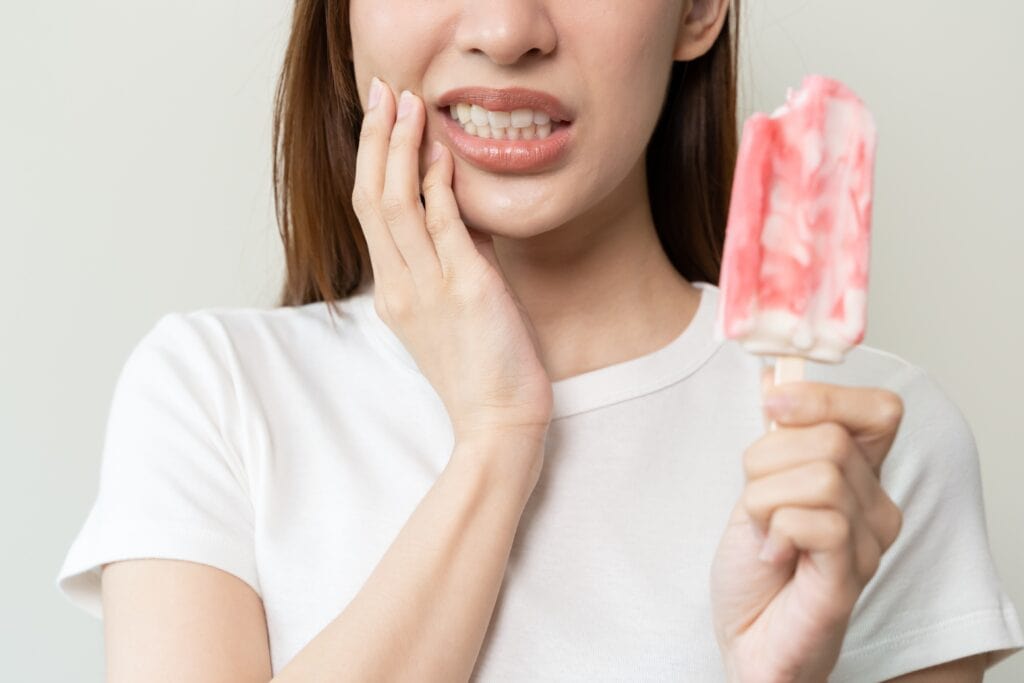Common Causes of Sensitive Teeth
If you’ve ever winced from the sharp pain of a cold drink or felt discomfort from a hot meal, you’re not alone. Many people struggle with sensitive teeth, a common dental problem that can cause a sudden, sharp pain in your teeth when they’re exposed to cold, hot, sweet, or acidic foods. The causes of sensitive teeth are varied and can include anything from worn tooth enamel to exposed tooth roots or gum disease. In this article, our dentists in South Perth will help you identify what triggers your tooth sensitivity and provide solutions to improve your oral health.

Causes of Sensitive Teeth
Sensitive teeth can be caused by a variety of factors that expose the nerves inside your teeth to external triggers. Below are some common causes of this discomfort.
Tooth Enamel Erosion: One of the Primary Causes of Sensitive Teeth
When the hard outer layer of your teeth, known as enamel, wears down, it leaves the underlying dentin exposed. This exposure can make your teeth more sensitive to temperature changes and acidic foods. Enamel erosion can happen from consuming too many sugary or acidic drinks. Protecting your enamel is key to preventing increased tooth sensitivity.
Tooth Decay
Tooth decay is a common culprit behind sensitive teeth. It occurs when bacteria in plaque produce acids that damage the tooth surface. As decay progresses, it can expose the inner layers of the tooth, causing sensitivity. Regular brushing and flossing can help prevent decay and the sensitivity that comes with it.
Receding Gums
Gum recession happens when the gum tissue pulls back from the tooth, exposing the root. This exposure can lead to sensitivity since the roots are not covered by hard enamel. Receding gums are often a result of hard brushing or gum disease. Gentle brushing with a soft-bristled toothbrush can help prevent this condition.
Gum Disease
Gum diseases, such as gingivitis or periodontitis, can cause the gums to become inflamed and sore. As the disease progresses, it can lead to gum recession and exposure of the tooth roots, increasing sensitivity. Regular dental check-ups with your Perth dentist and good oral hygiene are essential for preventing gum disease.
Fractured Teeth
Cracks or fractures in your teeth can expose the delicate inner layers that are full of nerves and blood vessels. This exposure can significantly increase tooth sensitivity. It’s important to seek dental advice if you suspect a tooth is fractured to prevent further damage and sensitivity.
Grinding or Clenching Your Teeth
Grinding or clenching your teeth, often during sleep, can wear them down over time. This not only damages your teeth but also can lead to increased sensitivity. A dentist might recommend wearing a mouthguard at night to protect your teeth.
Dental Procedures
It’s normal to experience increased tooth sensitivity after certain dental procedures, such as fillings, crowns, or teeth cleaning. This sensitivity usually decreases on its own over a few weeks. If it persists, it’s a good idea to consult with your dentist.
Use of Tooth Whitening Products
Using tooth whitening products can sometimes lead to temporary sensitivity. This is because many of these products contain chemicals that can irritate the tooth nerve. If sensitivity from whitening treatments becomes bothersome, consider consulting with your dentist for alternatives.
Plaque Build-Up
Excessive plaque build-up can lead to tooth decay and gum disease, both of which can cause sensitivity. Regular brushing, flossing, and dental cleanings can reduce plaque and lower your risk of sensitive teeth.
Temperature Sensitivity: Environmental Causes of Sensitive Teeth
Sometimes, environmental factors, like very cold or hot weather, can trigger tooth sensitivity. This is due to the expansion and contraction of tooth material in response to temperature changes, which can expose sensitive spots. Using a toothpaste designed for sensitive teeth may help mitigate this type of sensitivity.

Professional Treatments for Tooth Sensitivity
Professional treatments for tooth sensitivity offer a range of effective options:
Desensitizing Agents: These treatments involve applying substances that block pain signals from reaching the nerves, providing relief from the discomfort caused by sensitivity.
Bonding Agents: This method covers exposed root surfaces, which are often the source of sensitivity, thus shielding them from external stimuli that can trigger pain.
Dental Crowns: For more severe cases, crowns are used to protect and cover worn-down enamel, significantly reducing sensitivity by providing a durable barrier against external factors.
Regular Check-Ups: Maintaining regular dental appointments is crucial for managing sensitivity effectively, allowing for timely interventions and adjustments to treatment as needed.
Everyday Tips to Reduce Tooth Sensitivity
There are simple steps you can take daily to manage and reduce tooth sensitivity. These habits are easy to incorporate into your routine and can make a significant difference in your comfort.
Choosing the Right Toothbrush
Using the right toothbrush is crucial for preventing further sensitivity. Opt for a soft-bristled brush that is gentle on both your gums and enamel, reducing the risk of aggravating sensitive teeth. Brushing too hard can wear down your enamel, so combine gentle strokes with a soft brush to keep your teeth healthy. Remember to replace your toothbrush every three to four months or sooner if the bristles start to fray.
Avoiding Acidic Foods and Drinks
Using the right toothbrush is crucial for preventing further sensitivity. Opt for a soft-bristled brush that is gentle on both your gums and enamel, reducing the risk of aggravating sensitive teeth. Brushing too hard can wear down your enamel, so combine gentle strokes with a soft brush to keep your teeth healthy. Remember to replace your toothbrush every three to four months or sooner if the bristles start to fray.
Using Toothpaste for Sensitive Teeth
Toothpaste formulated for sensitive teeth can be a game-changer. These toothpastes contain compounds that help block the pathways through which pain signals travel inside the tooth. Apply a small amount on a soft toothbrush and brush gently to avoid further abrasion to the enamel. Regular use of desensitizing toothpaste can provide lasting relief and help you enjoy your favourite foods and drinks without discomfort.

Feel the Difference at Acts Dental: Schedule Your Sensitivity Check Today!
Experience the relief you deserve and say goodbye to sensitive teeth with a professional sensitivity check at Acts Dental. Our team is ready to provide personalized treatments that target the root cause of your discomfort.
Our experienced dentists also offer professional wisdom teeth removal and emergency dental care for those in need of urgent dental care.
We take pride in being a HBF preferred provider, HCF preferred provider, Medibank preferred provider, NIB preferred provider, and Bupa preferred provider dentist in Perth.
Don’t let tooth sensitivity hold you back any longer; book your appointment today (08) 9474 5083 and start enjoying your daily activities pain-free.


